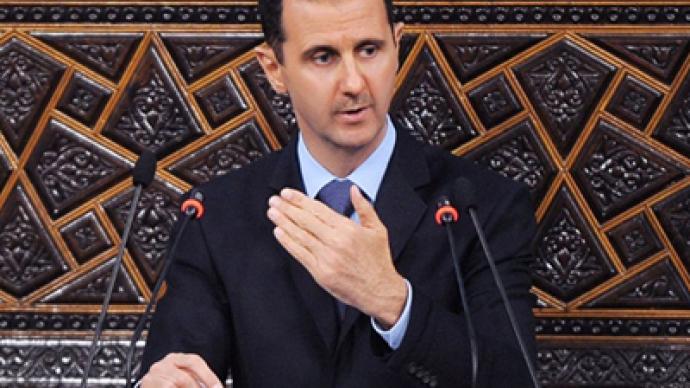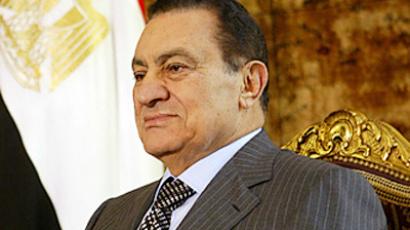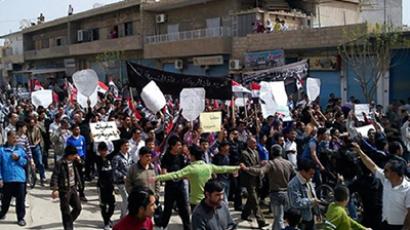Syrian president is a prisoner of his security forces – British journalist

Alan Hart, a British writer and journalist, shared his insight into the ongoing unrest in Syria. He says the country's president, who once touted himself as a reformer, is most likely a prisoner to the will of his security forces.
RT:You have been speaking recently a lot about whether mainstream media has betrayed the idea of democracy in the Middle East in its reporting. Do you think it has?Alan Hart: Oh, I think it has totally betrayed democracy because there is a political reality to be faced. No American president – and only an American president matters, only an American president has the leverage to require or to be serious about peace – he is never going to use that leverage because of the control of the Zionist lobby in Congress. He is never going to use the leverage, even if he wants to, until he is pushed to do so by informed public opinion, one might say by demonstrations of real democracy in action. The problem in America, and frankly in Europe but most of all in America, is that most citizens are too uninformed and misinformed to do the pushing. And that is frankly because the media has been complicit with Zionism in suppressing the truth of history as it relates to the making and sustaining of the conflict. So I think it’s very simple.RT: And what about the present, what about these demonstrations and conflicts that we are seeing in the Middle East at the moment? What is your view of how the media has coped with that?AH: I think generally speaking the coverage is ok. But the whole thing is exciting but also frightening to me, because I think the message that all the autocrats have got from Mubarak’s departure is: “If our people take to the streets and start to demonstrate then shoot them”. I mean that’s what seems to be happening.But I think the key, frankly, is in Egypt, and I’ll tell you why. I think that they probably will evolve to an elected government, because the pressure – the generals may not like it – but the pressure is there. So, let’s assume down the road nine months, ten months, there is an elected government. There is then a problem of the separate peace with Israel. Now how the hell does the new government handle that? There is a way in which they could do it very cleverly and maybe change everything in the Middle East. If the new government said “we’ll have a referendum on this treaty”. And if there was a referendum, my guess is that 80 per cent of Egyptians would say “tear it up, we don’t want it. It hasn’t served our interests, it hasn’t served the Arab interests, its only re-entrenched Israel.” Now with that kind of referendum result a new government in Cairo could say to America: “You’ve heard our people speak. You say you like democracy. We don’t want this treaty, but we’ll have the treaty. We’ll keep it, if you use your leverage on Israel to get them out of the occupied territories.” What a fascinating scenario that would provide.RT: Ok. Let’s take it back a bit, and let’s talk a bit about Syria, because that is the current country that is entering into this whole process at the moment. Europe and the US have reiterated calls for UN sanctions. But it is a country that has been under international pressure for a long time over its ties to Iran and its support for Hezbollah and Hamas. How serious do you think this threat of sanctions is?AH: Well, maybe it is serious, so what? I don’t think young Assad is in control. I think Assad is probably more or less a prisoner of his generals and the security services. He gave the world the impression when he came to power 10-11 years ago that he was going to be, not like his father who was a tyrant, he was going to a reformer. I suspect that probably was the genuine “son of the father”, but I think right now he is probably, as I would say, a prisoner. And they are just going to shoot, and shoot, and shoot. And rather like the Israelis don’t give a damn about what the world thinks, I don’t think Syria’s security forces will either. RT: Some say this call for sanctions is the first step towards a no-fly zone, and we all know what happens from there. Do you think that the West could use the Libyan scenario as a sort of excuse for intervening in Syria?AH: The Libyan scenario to me is nonsense. I mean what have we got at the moment? We have got a stand-off. See, I think most people have made a mistake about Gaddafi. He was written off in the media, and newspapers, and television as mad. I think that is a complete misreading of the man. I think he is evil but not mad. I think he has set up his whole security aparatus very cleverly over the years, he knows exactly what he is doing. So, I don’t think that sends any kind of message except: “Don’t get involved in the way that the French and the British have, don’t get involved unless you are prepared to go the whole hog.” And the whole hog frankly would be targeting him, and killing him. So I don’t see what lessons Libya holds for dealing with Syria.RT: Of course we have learnt a sort of lesson about the NATO allies. I think popular opinion suggests that NATO is divided, slow to act, and its goal of protecting the civilians in Libya is really nowhere to be seen anymore. Is NATO in any case capable of leading another action?AH: No, I don’t think it is. I mean everybody is terrified of what happened in Iraq, because most people know that was illegal. But the problem is now, even if NATO could get its acts together and say “we must deal with these tyrants, we must really put sanctions on them and, if necessary follow up with military action, boots on the ground,” it would not get through the Security Council. China would veto it, I’m sure Russia would veto it. See, what people do not understand about the United Nations is it’s not a self-standing institution, it is the sum total of the hypocrisy of the member states. And unless you can actually have a total consensus, working through the UN actually becomes impossible.RT: Syria has a good relationship with Iran, which could give Damascus a strong supporter in all of this. Would you expect Tehran to react if NATO did get involved?AH: I think Tehran would be very worried about what’s going on now, because as I understand the situation in Tehran, the present regime probably only has the support of 30 per cent of the people. So I think it’s got to think very deeply about how it responds to this. But the ties between the regime in Damascus and the regime in Tehran are very strong. But I also think Hezbollah has vested interest in what is going on here. I mean, I am not one of those who write Hezbollah off as a terrorist group. I think Sheik Nasrallah, Hezbollah’s leader, is head and shoulders above all other Arab leaders in the region. I think he is a real leader, and I think Hezbollah has evolved into a truly democratic party. So, I don’t think it would want any boats rocked either.But if Syria were to fall, I think you are really asking me what would happen. Well, I don’t think Syria will fall to the extent that I can’t see a scenario in which Syrian security doesn’t remain in control. And what the world doesn’t know about Syria is that for many years under this present president’s father, it actually cooperated with Israel. It was actually at times an Israeli puppet. In the 1967 war – I tell the full story of this in my book – there was a secret understanding between Syria and Israel before the ‘67 war. So Syria plays its cards very, very well to survive in this region. It’s much too early to write off the regime there in my view.RT: And what about the regime in Iran? Some are saying that the entire point of this, the entire goal, as far as the Western powers are concerned, is to isolate Iran and thereby force regime change. Do you agree with them? AH: No, I don’t. The more the outside pressure comes on Iran, the more I think it is going to unite the people of Iran. You see, there is this ridiculous story that Iran wants to develop nuclear weapons. There is absolutely no evidence whatsoever that the regime wants to develop nuclear weapons. I mean they categorically say they don’t. The nonsense of it comes down to this: supposing Iran did have a few nuclear weapons, do you think it would launch a first strike on Israel? Of course it would not, because Iran would be obliterated. This is just a bluff, and it serves Israel’s purpose because it takes the world’s attention away from what Israel is doing, which is talking peace and continuing to expand its settlements. I mean Israel, its leaders, must be actually very happy with what is going on in the Arab world actually. Because again it has taken all the focus away from Israel and it gets on quietly, building more and more settlements.RT: How possible do you think it is that in the wake of all these revolutions in the Middle East, Islamists will come to power in the region?AH: This is the terrifying thing. If we stand back and look how it evolved through Tunisia, through Egypt, what we might call the extremists or the fundamentalist Muslims, they were not in the game. It was basically very ordinary people of all classes and all backgrounds. If the suppression goes on and on, what that will do is eventually open the door to the extremists. So in my view, the West should now be solidly behind the street as it were, to bring about the reforms and the changes they want. Because that is the way to guarantee that the fundamentalists won’t have the oxygen, if you like, to come into the business. It is a huge issue.RT: And what about Israel in all of this, will it be a less safe place in the future do you think? AH: Israel has never been an unsafe place. One of the greatest lies, the mother and father of all lies related to the Israeli-Palestinian conflict is that Israel has been in danger of annihilation. I detailed it in three volumes of my book, it is a complete lie. Israel’s existence has never ever been in danger from any combination of Arab military force, and that is unlikely to change in any foreseeable future.














